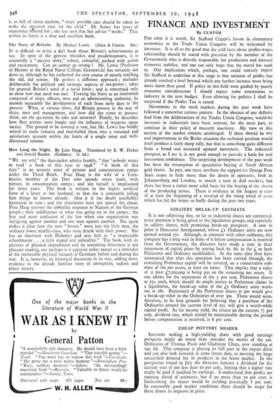FINANCE AND INVESTMENT
By CUSTOS
FOR what it is worth, Sir Stafford Cripps's lesson in elementary economics to the Trade Union Congress will be welcomed by investors. It is all to the good that the cold facts about profits-wages relationship should be stated with precision by the member of the Government who is directly responsible for production and internal economic stability, and one can only hope that the moral has sunk in. One implication which, perhaps, one could scarcely expect Sir Stafford to underline at this stage is that taxation of profits has already reached a level beyond which any further increase must bring more harm than good. If policy in this field were guided by purely economic considerations I should expect some concessions to industry in the next budget. Even allowing for politics I shall be surprised if the Profits Tax is raised.
Movements in the stock markets during the past week have followed a somewhat curious pattern. In the absence of any definite lead from the deliberations of the Trades Union Congress, would-be investors in industrials have been content, for the most part, to continue in their policy of masterly inactivity. My view -ot this section of the market remains unchanged. If there should be any real improvement in the Berlin situation the technical position would itself produce a fairly sharp rally, but that is something quite different from a broad and sustained upward movement. The industrial prospect, as I see it, is not good enough to provide a basis for real investment confidence. The surprising development of the past week has been the resumption of speculative buying of South African gold shares. In part, one must attribute the support for Orange Free State issues to little more than the desire of operators, both in Johannesburg and London, to snatch a turn in dull markets, but there has been a rather more solid basis for the buying of the shares of the producing mines. There is evidence in the August re urns of at least the beginning of a reversal of the rising trend of costs which has hit the mines so badly during the past two years.
COLLIERY BREAK-UP ESTIMATE
It is not arprising that, so far as industrial shares are concerned, more attention is being given to the liquidation groups, and especially to colliery shares, with promising break-up prospects. A case in point is Doncaster Amalgamated, whose LI Ordinary units are now quoted around 25s. Although, in common with other collieries, this company has a long wait in front of it before compensation is received from the Government, the directors have made a start in their repayment of capital plans by paying back 6s. 8d. in the £ to both Preference and Ordinary stockholders. At the same time they have announced that after this operation has been carried through, the remaining Preference capital will be covered, on a conservative esti- mate of the net assets, at least six times. That implies that a value of at least L7,200,000 is being put on the remaining net assets. If one allows for the repayment of the 5 per cent. Preference shares at 25s. each, which should do ample justice to Preference claims in a liquidation, the break-up value of the £r Ordinary units works out at 28s. Repayment of the Preference shares at par would give a break-up value to the Ordinaries of over 3os. There would seem therefore, to be firm grounds for believing that a purchase of the Ordinaries around the current level of 25s. will give a worth-while capital profit. As for income yield, the return on the current 7f per cent. dividend rate, which should be maintainable during the period before compensation is received, is 6 per cent.
CHEAP POTTERY SHARES Investors seeking a high-yielding share with good earnings prospects might do worse than consider the merits of the los. Ordinaries of Thomas Poole and Gladstone China, now standing at 14s. 6d. This company is playing its full part in the export drive and can also look forward, at some future date, to meeting the large unsatisfied demand for its products in the home market. In the prospectus issued in July the directors forecast a dividend for the current year of not less than to per cent., hinting that a higher rate might be paid if justified by earnings. I. understand that profits are running ahead of estimates, but if no more than to per cent. is forthcoming the shares would be yielding practically 7 per cent. In reasonably good market conditions there should be scope for these shares to improve in price.


































 Previous page
Previous page